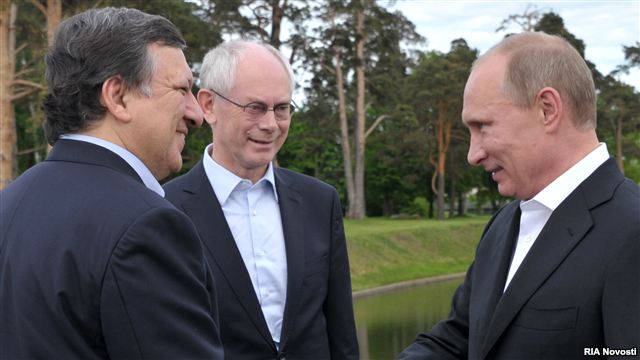Visas, trade, energy expected to dominate EU-Russia summit

European Union visas for Russians and clashes over energy and
imports are expected to dominate the two-day EU-Russia summit
opening late on Thursday, Radio Liberty reported.
Ahead of the summit in Brussels, the EU has announced its readiness
to make it easier for Russian citizens to obtain EU visas.
But reports say a last-minute request by Moscow to include
visa-free travel for Russian diplomats could jeopardize a deal
during the summit.
President Vladimir Putin and his ministers are also likely to
question the EU about a recent European Commission investigation
into alleged price-fixing by Russian energy giant Gazprom.
The EU, meanwhile, is likely to complain over Russia's failure to
lower tariffs for EU wood, paper, and cars in line with Word Trade
Organization (WTO) rules. Russia joined the WTO in August.
The summit is scheduled to include talks between Putin and his
delegation and EU Council President Herman Van Rompuy and EU
Commission President Jose Manuel Barroso.
Visa Deal
The summit is likely to result in few concrete results.
The most likely hope for an agreement is on visa facilitation. A
deal would reduce paperwork and delays for some Russian citizens,
such as academics and businessmen, to travel to the EU.
The EU is reportedly ready to rubber-stamp a deal. But Moscow has
insisted that a new provision be included that would allow holders
of all government-service passports, such as diplomats, visa-free
travel to the EU.
This faces some resistance from the EU, which had hoped to
primarily promote easier travel for ordinary Russians to the
EU.
Since the last EU-Russia summit in Brussels in February 2011, the
European Commission has opened an investigation into alleged
price-fixing by Gazprom. The probe could eventually result in
billions of euros in fines and renegotiations of contracts.
Russian officials are expected to push for exemptions from an EU
policy that calls for the separation of energy-production and
energy-transmission firms.
Russia's ambassador to the EU, Vladimir Chizhov, says Moscow is
keen to secure a waiver for its South Stream pipeline. Russia
argues that projects crossing several non-EU, as well as EU member
states, should fall outside the legislation.
Trade, Human Rights
The EU, meanwhile, is likely to raise complaints about trade.
Many of the problems are related to trade barriers, such as a fee
on cars recycled from abroad, that Russia is obligated to remove as
a member of the WTO.
There have been threats to take Russia to court over high tariffs
on car parts, wood and paper products, and a ban on imports of live
pigs.
Chizhov argued that Russia cannot liberalize so quickly.
"The Russian economy really needs a bit of time to digest that and
to adapt itself to WTO membership," Chizhov said.
"That is why Russia is not fully prepared to make another leap
towards liberalizing its trade and economic links with its
strategic partner, the European Union."
The EU will also voice concerns about human rights in Russia,
according to Maja Kocijancic, spokeswoman for EU foreign-policy
chief Catherine Ashton.
Worries about the treatment of the imprisoned member of the Russian
punk collective Pussy Riot, and recent laws that make the
functioning of civil society in Russia harder, are expected to be
raised.
The case of whistle-blowing Russian lawyer Sergei Magnitsky will
also be raised, even though the EU has refrained from following the
United States in blacklisting Russians linked to his death.
Here we are to serve you with news right now. It does not cost much, but worth your attention.
Choose to support open, independent, quality journalism and subscribe on a monthly basis.
By subscribing to our online newspaper, you can have full digital access to all news, analysis, and much more.
You can also follow AzerNEWS on Twitter @AzerNewsAz or Facebook @AzerNewsNewspaper
Thank you!
